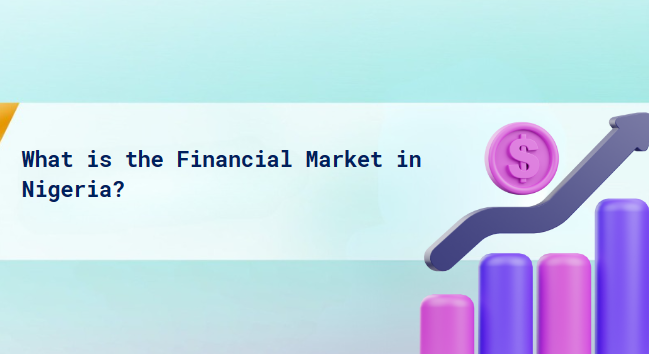
What is the Financial Market in Nigeria?
Author Taiwo Temitope-Adesope
A financial market is a platform where buyers and sellers engage in trading various financial instruments, such as stocks, bonds, currencies, and derivatives. In Nigeria, the financial market plays a crucial role in facilitating the efficient allocation of resources and capital flow within the economy. It serves as a channel through which individuals, businesses, and governments can access funds for investment, expansion, and other financial needs.
The Nigerian financial market is a vital component of the country's economic landscape, contributing significantly to its growth and development. It enables the mobilization of savings, promotes investment opportunities, and facilitates the effective distribution of resources across various sectors of the economy. By providing a platform for capital formation and risk management, the financial market supports entrepreneurship, job creation, and overall economic prosperity.
Key Components of Nigeria's Financial Market
The money market in Nigeria is a crucial segment of the financial system that deals with short-term financial instruments, such as treasury bills, commercial papers, and bankers' acceptances. This market plays a pivotal role in facilitating the efficient management of liquidity and short-term funding requirements.
Banks and discount houses are the primary players in the money market, acting as intermediaries between borrowers and lenders. They facilitate the transfer of funds from surplus units (savers) to deficit units (borrowers), ensuring the smooth flow of capital within the economy.
The Capital Market
Nigeria's capital market is responsible for facilitating long-term financing through the issuance and trading of securities, such as stocks and bonds. This market serves as a vital source of funds for businesses, enabling them to raise capital for various purposes, including expansion, research and development, and infrastructure projects.
The Securities and Exchange Commission (SEC) is the regulatory body overseeing the capital market in Nigeria. It ensures fair and transparent practices, protects investors' interests, and promotes the development of the market. Key players in the capital market include the Nigerian Stock Exchange (NSE), stockbroking firms, issuing houses, and institutional investors.
Major Players and Institutions
The CBN serves as the apex regulator of the Nigerian financial system. It is responsible for formulating and implementing monetary policies, ensuring financial stability, and promoting a sound financial environment. The CBN plays a pivotal role in managing the country's money supply, interest rates, and foreign exchange reserves.
Commercial Banks
Commercial banks are the backbone of Nigeria's financial system, acting as intermediaries between savers and borrowers. They accept deposits from the public and provide various lending services, such as personal loans, business loans, and mortgages. Commercial banks are also primary players in the money market, engaging in short-term lending and borrowing activities.
Investment Banks
Investment banks play a crucial role in the capital market by underwriting securities, providing financial advisory services, and facilitating mergers and acquisitions. They assist companies in raising capital through the issuance of stocks and bonds, and they also offer portfolio management services to institutional and individual investors.
Securities and Exchange Commission (SEC)
The Securities and Exchange Commission (SEC) is the primary regulatory body responsible for overseeing and developing the Nigerian capital market. It ensures fair and transparent practices, protects investors' interests, and promotes the growth and development of the market.
Nigerian Stock Exchange (NSE)
The Nigerian Stock Exchange (NSE) is the primary platform for buying and selling securities, such as stocks and bonds, in Nigeria. It provides a marketplace for investors to trade financial instruments and helps companies raise capital through public offerings.
Development and Trends in Nigeria's Financial Market
Historical Growth
Nigeria's financial market has undergone significant transformation since the colonial era. Initially dominated by foreign banks, the market witnessed the emergence of indigenous banks and financial institutions following independence. Over the years, various reforms and policies have been implemented to promote the growth and stability of the financial sector.
Deregulation and Liberalization
In the late 1980s and early 1990s, Nigeria embarked on a series of economic reforms aimed at deregulating and liberalizing the financial sector. These reforms facilitated the entry of new players, introduced market-based pricing mechanisms, and fostered competition within the industry. The deregulation process paved the way for the development of new financial instruments and services, contributing to the overall growth and depth of the market.
Technology-Driven Innovations
The Nigerian financial market has witnessed significant technological advancements in recent years. The advent of financial technology (fintech) has revolutionized the way financial services are delivered. Online trading platforms, mobile banking, and digital payment solutions have gained traction, enhancing accessibility and convenience for market participants. These innovations have contributed to increased financial inclusion and have opened up new investment opportunities for both domestic and foreign investors.
Challenges and Opportunities
Challenges
- Limited Depth: Despite its growth, Nigeria's financial market remains relatively shallow compared to more developed markets. The range of financial instruments and investment options is still limited, hindering diversification and risk management strategies.
- Infrastructure Gaps: Inadequate infrastructure, such as reliable power supply and robust telecommunication networks, can pose challenges to the efficient functioning of the financial market.
- Financial Inclusion: A significant portion of the Nigerian population remains unbanked or underserved by formal financial services. Addressing this challenge is crucial for fostering inclusive economic growth and maximizing the potential of the financial market.
Opportunities
- Rapidly Growing Economy: Nigeria's economy is one of the fastest-growing in Africa, presenting ample opportunities for financial market development. A thriving economy fuels demand for financial services, attracting both domestic and foreign investment.
- Increasing Middle Class: The rise of Nigeria's middle class has contributed to a growing appetite for financial products and services, including savings, investments, and credit facilities.
- Potential for Foreign Investment: With its abundant natural resources and a large consumer market, Nigeria holds significant potential for attracting foreign direct investment. A well-developed and regulated financial market can facilitate the inflow of foreign capital, driving economic growth and development.
Conclusion
Nigeria's financial market is a vital component of the country's economic landscape, facilitating capital formation, resource allocation, and risk management. Comprising the money market and the capital market, it plays a crucial role in mobilizing savings, promoting investment, and supporting entrepreneurship.
While the market has witnessed significant growth and development over the years, there is still room for improvement. Addressing challenges such as limited depth, infrastructure gaps, and financial inclusion will be crucial in unlocking the full potential of Nigeria's financial market.
As the economy continues to grow and technology advances, the financial market is poised for further transformation and innovation. By fostering a conducive regulatory environment, embracing digital solutions, and promoting financial literacy, Nigeria can leverage its financial market to drive sustainable economic development and foster inclusive growth.
About Author

Taiwo Temitope-Adesope
Taiwo is a passionate storyteller and strategist dedicated to empowering women and crafting compelling narratives. A First-Class graduate in Mass Communication from Covenant University, she specializes in writing, public relations, and digital marketing. As a Content Manager at Suretree, she drove a 50% increase in web traffic through SEO and boosted website engagement by 60% in just four months. Her leadership experience includes serving as Public Relations Officer for the Covenant University Student Council and contributing to impactful volunteer initiatives. With expertise in strategic thinking and business acumen, Taiwo continues to create stories that inspire confidence and imagination.
.png?width=1615&height=444&name=nairaCompare%20Christmas%20logo%20(PNG).png)








